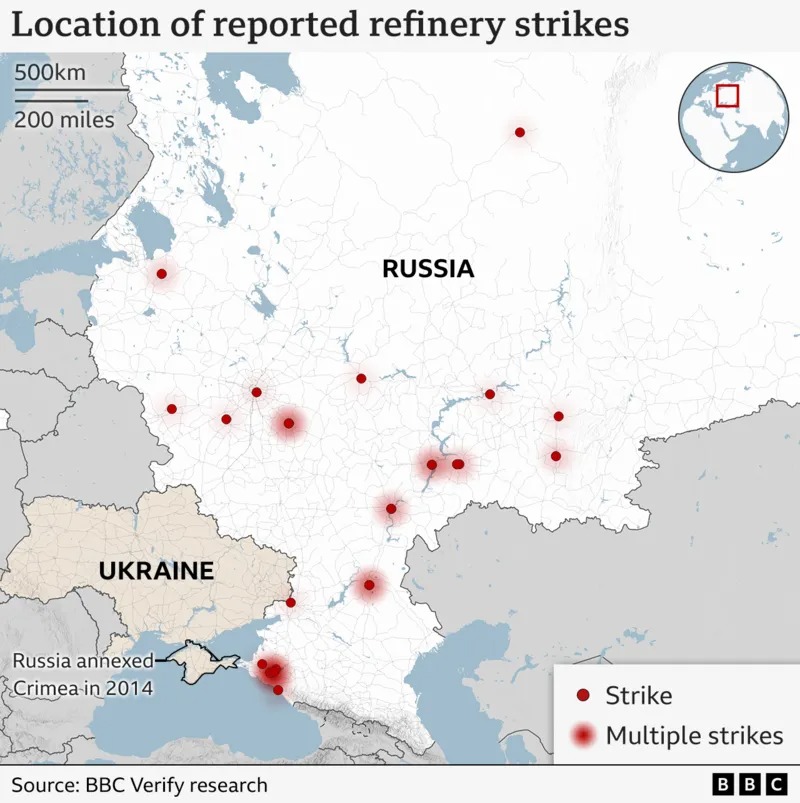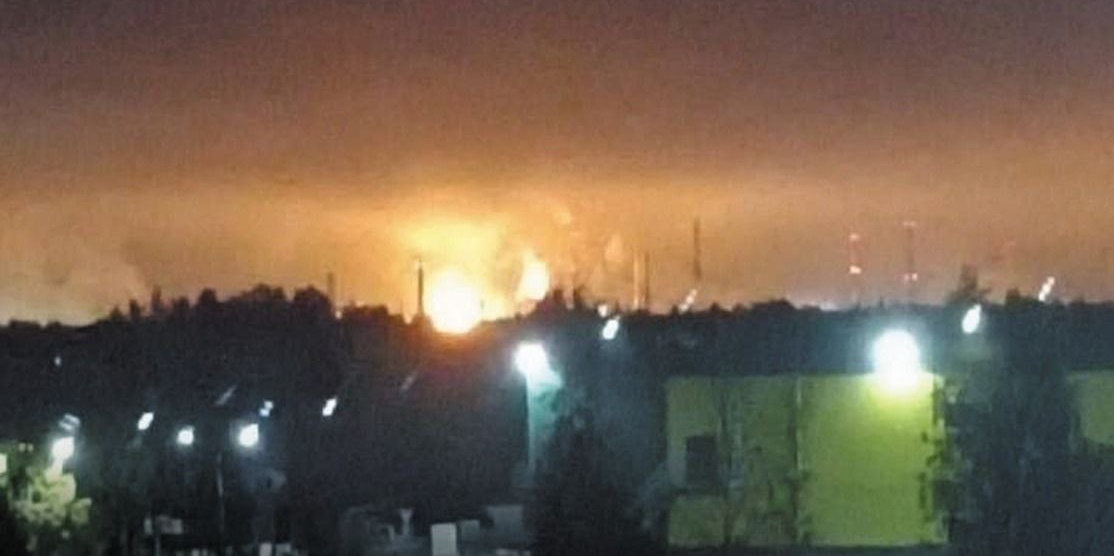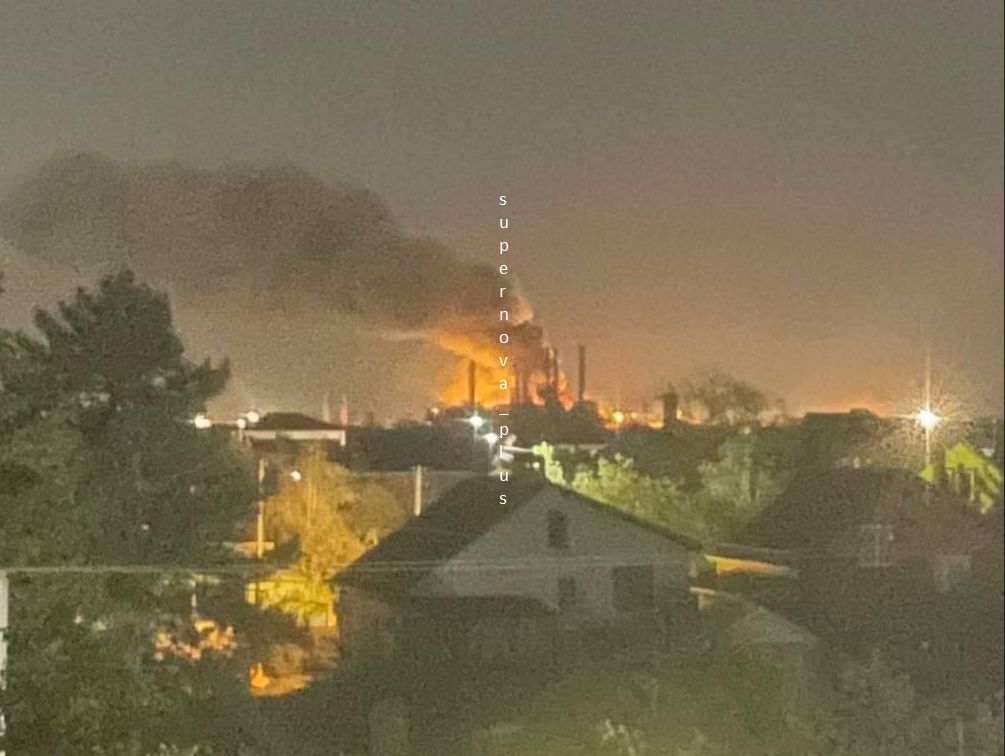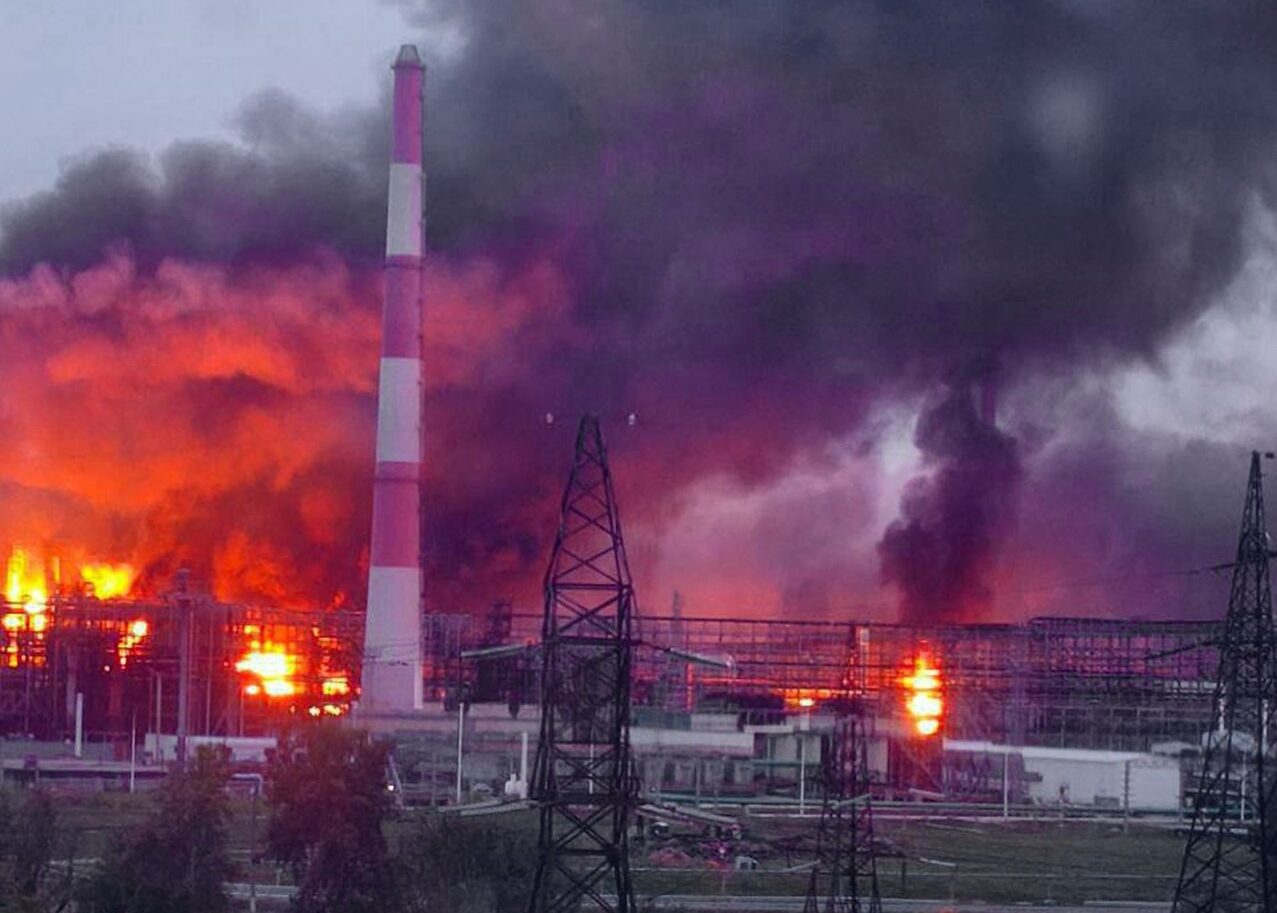Ukraine’s two-month strike campaign against Russian oil infrastructure wasn’t random — it followed a deliberate pattern. In a detailed analysis for Mezha, Vadym Hlushko, founder of the OSINT group Cyberboroshno, reveals exactly what Ukrainian forces targeted inside Russia’s refineries — and why each strike mattered more than its explosion.
Summer campaign marks sharp shift from earlier restraint
From spring into early summer 2025, Ukrainian forces largely avoided striking Russia's energy sector. Between 20 March and 30 June, Cyberboroshno documented 19 confirmed hits on Russian defense plants and 5 on military sites, but none on energy targets. This restraint may have stemmed from diplomatic pressure or what was described as an “energy truce,” while the focus shifted to Russia's military-industrial facilities.
The effect of those earlier strikes on defense factories was limited. Ukraine’s long-range weapons achieved some success, but without a large supply of heavy warheads, they could not inflict decisive damage on Russia’s military industry.

BBC Verify counts 21 Russian oil refineries hit since January — already 48% more than in all 2024
Data confirms growing strike rate and clear targeting logic
Cyberboroshno analyzed only confirmed attacks — verified through satellite images or on-site videos — excluding unverified media reports. Between August and September 2025, 30 attacks on Russian energy infrastructure were confirmed. Of these, 23 were successful, 2 failed, and 5 had undetermined results.
That translates into roughly three confirmed successful strikes per week. For comparison, from January to March 2025, there were 2.1 confirmed energy infrastructure hits weekly. Ukraine has not only maintained the strike pace but increased it compared to earlier phases.
The increased tempo reflects a more concentrated strategy. Instead of hitting warehouses or logistics centers, Ukraine focused its strikes specifically on energy infrastructure.
Ukrainian drones hit refinery heart: AVT units and pipeline chokepoints
According to the analysis, most confirmed successful strikes — nine in total — targeted atmospheric vacuum distillation units (AVT). These are essential for primary crude oil processing. Damaging them can halt a refinery’s production entirely.
Atmospheric-vacuum distillation units (ELOU-AVT series) are the most critical and most frequently targeted installations. They perform the initial distillation of crude oil, feeding the rest of the production chain. When one is disabled, the refinery’s main operation stops.
- ELOU-AVT-1 – Novokuybyshevsky refinery (1 August)
- ELOU-AVT-4 – Gazprom Neftekhim Salavat (18 September)
- ELOU-AVT-6 – Saratov refinery (10 August), Syzran refinery (15 August), Kirishy refinery (14 September), Gazprom Neftekhim Salavat (24 September)
- ELOU-AVT-11 – Novokuybyshevsky refinery (20 September)
- AVT (unspecified model) – Krasnodar refinery (30 August), Syzran refinery (30 August)
-
primary oil refining unit AT-22/4 – Afipsky refinery (26 September)

The second most frequent targets were technological overpasses — fuel pipeline systems inside the facilities. Five successful hits were recorded, four at refineries and one at a pumping station. These overpasses are critical for internal oil transport between installations. Even partial damage can disrupt entire production chains.
- Saratov refinery (10 August)
- Volgograd refinery (14 August, two overpasses)
- Syzran refinery (15 August)
- Bashneft-Novoil (13 September)
- NPS “Vtorovo” (7 September)
Third came natural gas fractionation and gas-condensate processing units, with four confirmed hits, and an attack on the natural gas processing plant. These systems are vital for producing liquefied gas and petrochemical products — essential for domestic consumption and exports.
- Ilsky refinery – gas fractionation unit (7 September)
- Gazprom Ust-Luga Gas Condensate Complex – cryogenic gas fractionation unit (24 August)
- Afipsky refinery – joint gas and condensate processing unit (7 and 28 August)
- Astrakhan gas processing plant – production line (22 September)
Ukrainian drones also hit five pumping and dispatcher stations of Russia's oil pipelines. These facilities are central to major pipeline systems. Damaging them can halt crude oil delivery over hundreds of kilometers, affecting both domestic logistics and exports.
- Unecha – pumping station and transfer zone (13 and 22 August)
- LPS “Nikolskoye” – substation (18 August)
- LPS “Naytovichi” – pumping station (29 August)
- LPS “Samara” – pumping and reservoir installation (20 September)
- NPS “Zenzavatka” – control station (24 September)
- NPS “Tingovatovo” – unspecified damage (27 September)

Ukraine disables 40% of one of Russia’s largest oil refineries processing 17.5 million tons annually
Not all explosions signal success
Trending Now
Not every attack yielded significant results, as confirmed in two prominent examples. One involved the Ukhta refinery. Media reported explosions, air raid sirens, and a damaged tank, but no fire or critical damage followed. The only confirmed impact was a punctured tank that did not ignite.
In another case, video showed a blast near the Saratov refinery. Later, it turned out the drone had hit a nearby lake rather than the facility itself.
These examples underscore the need for careful post-strike assessment. As the analysis points out, a dramatic video alone does not guarantee the enemy suffered meaningful losses.
Supply disruptions ripple across Russian regions
Even some successful strikes brought only short-term effects. Damage to infrastructure tied to the Druzhba pipeline, for example, interrupted Russian fuel supplies to Hungary for only a few days before Russia restored operations.
However, many attacks did cause production and logistics disruptions. Russian open sources, reviewed by Cyberboroshno, reported fuel shortages in 33 out of 83 Russian federal subjects. These issues are now affecting consumers nationwide.
The timing of Ukraine’s campaign may have amplified its effect. The strikes coincided with peak fuel demand, as farmers require significantly more diesel during the harvest season. However, analysts suggest the Russian military is unlikely to face shortages — the armed forces are likely prioritized, while civilian sectors and exporters absorb most of the impact.

FT: American intelligence helped Ukraine attack over a dozen key Russian oil refineries since midsummer
Nevertheless, the campaign puts economic pressure on Moscow. Oil and petroleum products reportedly make up roughly 30% of Russia’s budget revenues.
Early numbers misleading — true impact will take time: the campaign continues into October
Determining the exact percentage of destroyed oil processing capacity remains difficult. Early in 2024, some reports claimed Ukraine had knocked out 14% of Russian refining capacity. By year-end, Russia had recovered some plants and increased output at surviving facilities. The actual annual decline was just 3%.
Now, during the current campaign, various sources report different and sometimes contradictory figures. The Russian outlet RBC claimed 38% of refinery capacity was offline, two-thirds due to Ukrainian strikes. Kommersant reported a 20% fuel shortage and a production drop of 1 million tons in September.
Cyberbotoshno notes that Ukraine’s campaign continues and conclusions remain premature.
In the first half of October, Ukraine has already hit more Russian fuel facilities.
- Ukraine struck more Russian oil refineries, including the facilities in Yaroslavl Oblast more than 700 km from Ukraine, Leningrad Oblast, facilities in Bashkortostan and Orenbug Oblast both 1,400 km away, and other processing plants.
- Several attacks targeted the Feodosiia maritime oil terminal in occupied Crimea, causing massive fires.
- Another target was a natural gas processing plant in Volgograd Oblast.
Read also
-
Frontline report: Ukrainian drones systematically dismantle Russian oil infrastructure in sustained campaign
-
Russia blames drone “debris” again—Afipsky oil refinery erupts in fire overnight
-
Ukrainian naval drones paralyze Russian oil export hubs; 2 mn barrels daily capacity hit
-
From battlefield to oilfields: Ukraine’s drones squeeze Russia’s war economy




